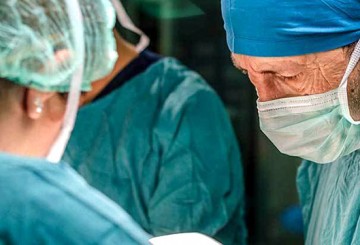Tag: Women’s Health
-

Study Finds Sex-Specific Differences in Chronic Rhinosinusitis
Kathryn E. Hulse, PhD, research assistant professor in Medicine-Allergy-Immunology, found that while men are more likely to have chronic rhinosinusitis with nasal polyps, women with the disease have a more severe form.
-

Targeted Radiation Controls Spreading Breast Cancer
Radioembolization may offer an alternative to chemotherapy for breast cancer patients whose tumors have spread to the liver.
-

Carotid Artery May Hold Clues to Predicting CVD in Lupus
Rosalind Ramsey-Goldman, MD, professor of Medicine-Rheumatology, recently published a paper in the American Journal of Cardiology that links plaque in the carotid artery of women with lupus to an increased risk of cardiovascular events.
-

New Path to Stop the Spread of Breast Cancer Cells Discovered
Scientists identified a new protein that plays a key role in reprogramming cancer cells to migrate and invade other organs. When that protein is removed from cancer cells in mice models of the disease, the ability of the cells to metastasize to the lungs is dramatically decreased.
-

Scientists Publish Finding on Cause, Progression of Endometriosis
Chair of Obstetrics and Gynecology says discovery will help scientists understand one of the major causes of female infertility.
-

Device That Protects Against HIV, Pregnancy Enters Clinical Trial
An intravaginal ring, developed by Northwestern scientist Patrick Kiser, is the first device to be tested in women with the potential to protect against HIV, herpes and unwanted pregnancy.
-

Northwestern Students Win Global Startup Contest
The team of six students developed a winning business plan for a patented, personalized therapy that stimulates the immune system to fight breast cancer.
-

Review Unifies Half Decade of Uterine Fibroid Research
Serdar Bulun, MD, authored an article in the New England Journal of Medicine that combines recent uterine fibroid research into a useful framework for scientists, clinicians, patients and the pharmaceutical industry.
-

New Device Extremely Effective at Preventing Immunodeficiency Virus
A new intravaginal ring filled with an anti-retroviral drug demonstrated a 100 percent success rate protecting primates from the simian human immunodeficiency virus (SHIV).
-

Woodruff Becomes President, Molitch Given Educator Award at ENDO 2013
Amidst the presentations and poster sessions, faculty from Northwestern University Feinberg School of Medicine were honored with a pair of major recognitions at the Endocrine Society’s 95th annual meeting.






